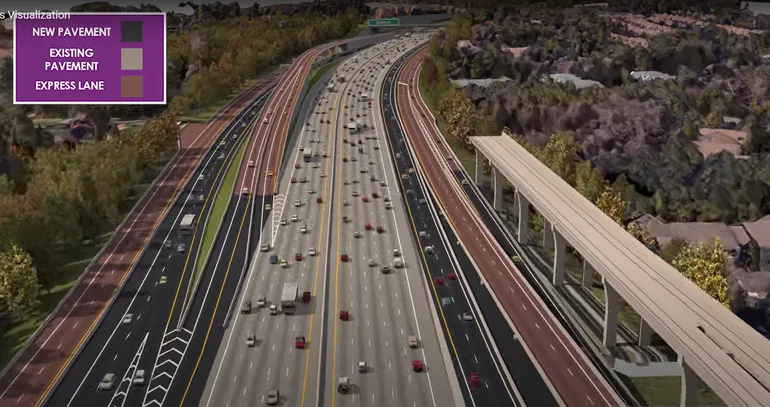A $4.6 billion Georgia toll road is moving ahead after the State Transportation Board approved SR 400 Peach Partners on Aug. 15 for the public-private partnership project. The consortium of road-building and engineering companies will design, build, partly finance, operate and maintain the State Route 400 Express Lanes for 50 years, with oversight by the Georgia DOT and the State Road and Tollway Authority.
SR 400 Peach Partners, the apparent best value proposer, is composed of Coral Gables, Florida-based ACS Infrastructure; Paris-headquartered investment manager Meridiam; Parsons of Chantilly, Virginia; and Dragados, Acciona Concesiones and Acciona Construction, which are all headquartered in Madrid.
They beat out one other team, Georgia Express Link Partners, made up of Roslyn Heights, New York-based Tikehau Star Infra; Amsterdam-based Arcadis; and Ferrovial Construction and its subsidiary Cintra, both of Madrid.
The project will add new express lanes in both directions along an approximately 16-mile section of Georgia 400 from the North Springs MARTA Station in Fulton County to about one mile north of McFarland Parkway in Forsyth County, per the project website. The lanes will have tolls that vary based on level of traffic to allow drivers to bypass congestion, and a MARTA bus rapid transit line is also slated to run along the corridor toll-free.
It is part of a larger construction effort aiming to relieve congestion at the SR 400 and I-285 interchange, and will directly connect with the proposed I-285 Top End East. The new lanes will be part of the Georgia Express Lanes Network.
A combination of private sector, state, federal and local dollars will fund the project, according to project documents. The private partner has committed to making a concession payment to the state of $4.05 billion and will deliver the project through a combination of financing methods.
Construction is expected to start in late 2025, per a project fact sheet, and the lanes are slated to start operating by 2031.
Over the next year prior to construction start, the team will focus on completing final concept designs, environmental re-evaluations, obtaining necessary project financing and permitting, according to the project website.

